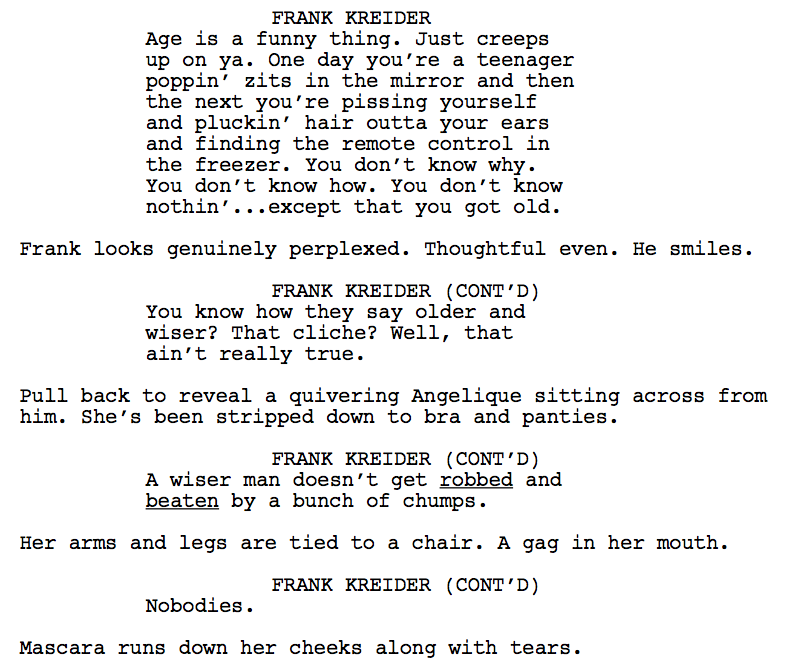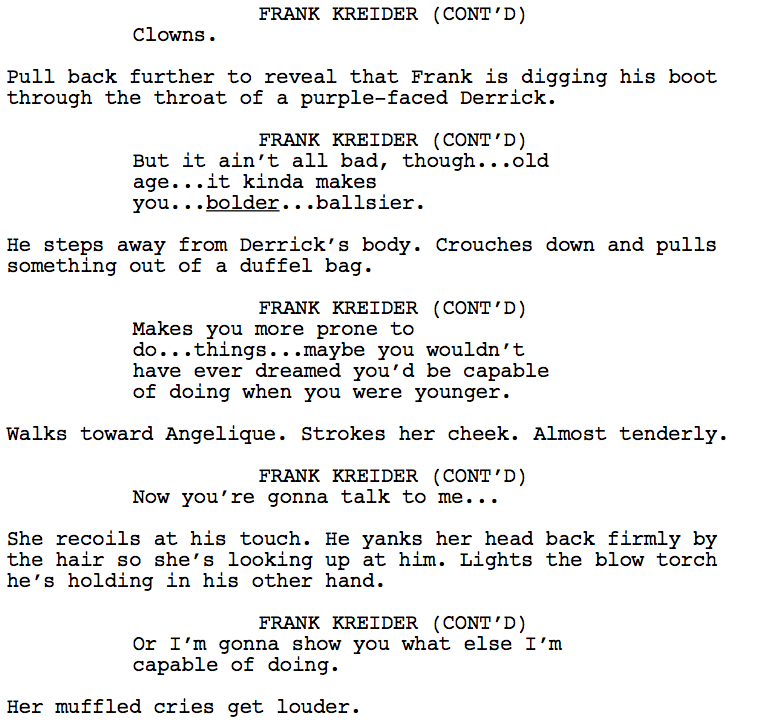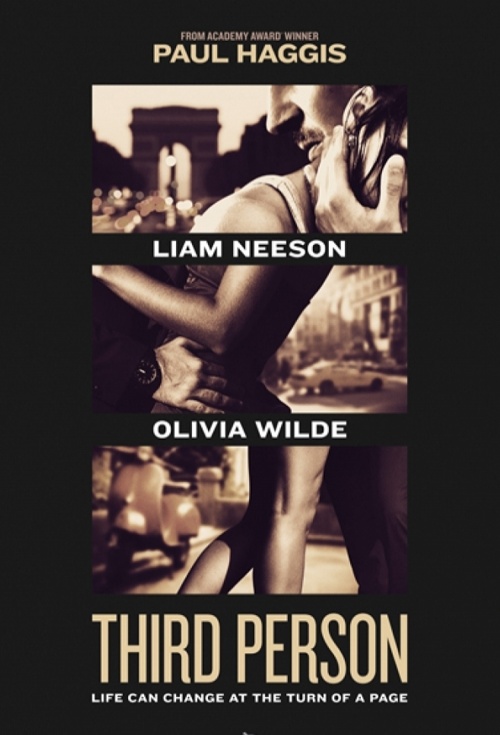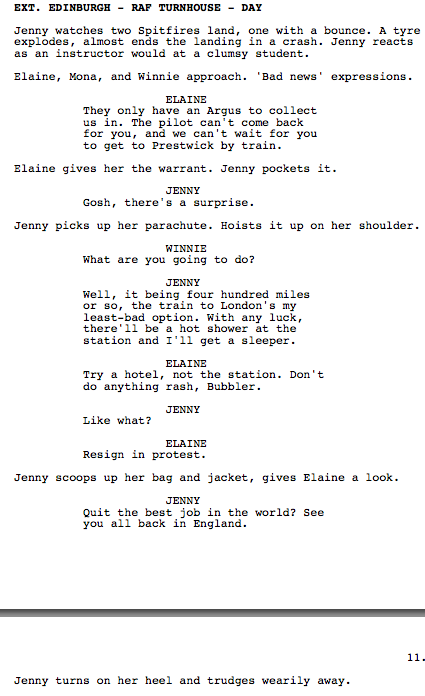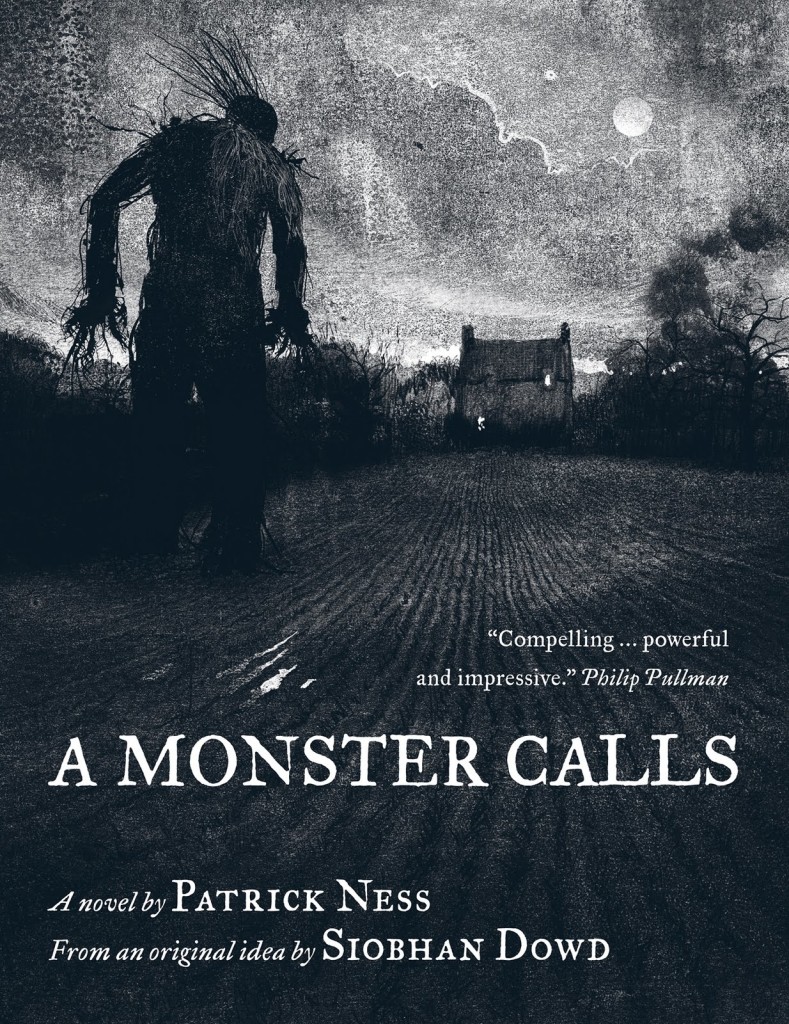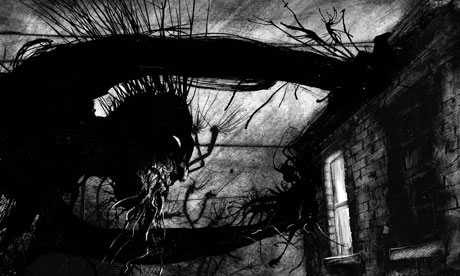Genre: TV Pilot – Drama
Premise: A former cop who’s lost custody of his son to a vindictive ex-wife, moves back home to plot how to get him back. In the process, he meets some old friends on the wrong side of the law, friends who may be the only people who can help him.
About: Okay, I’m super confused here. I read on Deadline that Badlands was a show that showrunner Shawn Ryan (The Shield) was doing for HBO. It covered a mining town in Wyoming. But this pilot, which was labeled as “HBO – Badlands” in the document title, is not about mining at all (thank God). So I’m guessing this is a completely separate pilot named “Badlands” that someone erroneously thought was the HBO pilot? Or Deadline was just way off? Either way, the writer, Joe Nienalt, has a short but sweet interview over at “The Boring Stuff” blog about the difficulties of being an “almost there” screenwriter. UPDATE: Okay, I got some new info here. Joe is NOT from Australia. The guy who interviewed him was. Joe is from Philly. Also, this is not the HBO Badlands. But, this pilot did get Joe invited to submit to the Sundance TV Lab (you have to have someone vouch for you to submit). I know Sundance really helps people get their stuff made, so maybe you can ask Joe about that process in the comments. — Also, I changed the dialogue sample. I knew it wasn’t the perfect sample but I’m still learning this screen grab thing (I can’t scroll and capture long scenes. I can only capture what’s on the physical screen, which limits me). Hope it’s a better representation.
Writer: Joe Nienalt
Details: 62 pages
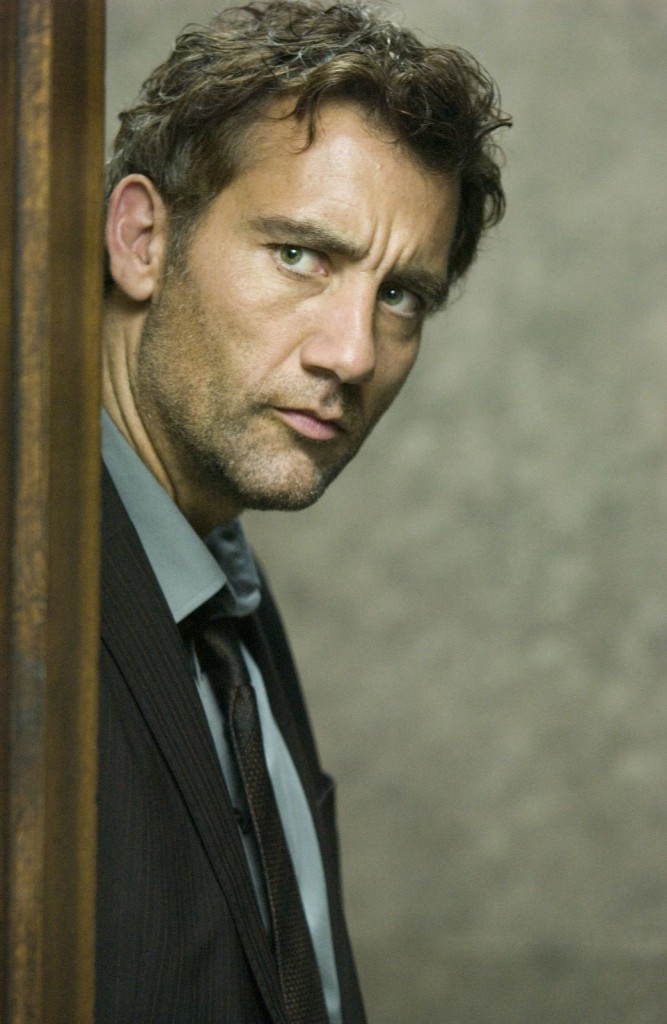 I wouldn’t mind seeing Clive Owen take on a TV role.
I wouldn’t mind seeing Clive Owen take on a TV role.
So I was reading the interview I linked above for today’s writer when I came upon something he said that happens to be one of the most debated topics in screenwriting. Joe said that when he stopped worrying about what was marketable and what Hollywood wanted and focused more on himself and what he cared about, that’s when Hollywood noticed him.
Writers can go crazy overthinking this, and I’ve gone back and forth on it over the years. Then recently, something occurred to me that I hadn’t thought of before: timing. Writers break through when they’re ready – when their mastery of the craft gets to the point where they can write good screenplays. Therefore, whatever genre they’re writing at that time (a big action movie or a small personal drama) becomes the one that breaks them in.
The writer then says to himself, “I broke in with an action movie so Hollywood is about being commercial,” or “I broke in with a personal script so Hollywood is about being true to yourself,” and then they ride that mantra along for the rest of their career, believing it’s the only way. That can be misleading because maybe you’d just gotten good enough that whatever you wrote next was going to be the one.
Because the thing is, you can take either of these approaches too far. If you think it’s all about being true to yourself and ignoring the commercial aspect of the industry, you can write something that’s so innocuous, nobody gives a crap. And if you think it’s all about giving them vampires and robots wrapped inside a catchy hook, you can write something so vapid that nobody gives a crap.
So I love reading scripts from writers who have declared themselves believers of one way over the other, as I feel that each of these scripts gets me one step closer to finding the definitive answer.
Now I originally thought this pilot was about mining, and boy did I wonder how the hell someone was going to make that interesting. The subject matter isn’t quite that boring, but it was lacking a hook. So let’s see if Joe was still able to make it entertaining.
30-something Joseph “Buddy” Shields, a former cop, happened to marry the wrong woman. Like a really terrible woman. And that woman, who’s now his ex, is raping him of everything he has, including his home, and most importantly, his son. The ruling is so bad that not only does Buddy have to leave his home, but he still has to pay the mortgage while his ex-wife lives there. His reward? Seeing his kid once every other weekend.
That isn’t enough for Buddy. His kid means everything to him and he’s willing to fight to get him back. The problem is, he doesn’t have any money for a good lawyer, and lawyers are the people who get your kids back in these wars.
Broke, Buddy is forced to head back home to Philadelphia and live in his mother’s house. His old neighborhood, Badlands, is the worst in the city, and we quickly realize Buddy was one of the few to escape and actually do something with his life.
Now that he’s back, all those “bad influence” friends start visiting him again, including his old buddy “Fast,” who’s become a bit of a criminal in his middle-age. Fast sees how badly Buddy wants his kid back and offers him a deal. Join him, run some “jobs,” and he’ll be able to afford any lawyer he wants.
Buddy doesn’t think twice. His kid is everything to him. If he has to lie, cheat, and steal to get him back, that’s what he’s going to do. But when Buddy realizes that some of these jobs entail killing some of his old friends, he realizes just how deep this rabbit hole goes. But in the end he feels that if his son is at the bottom of that rabbit hole, then fuck it, he’s willing to dig.
I got to give it to Nienalt. This was really good writing. I know something’s good when a) I’m involved even without a story hook, and b) when the writer can make things I’ve already seen before interesting.
That’s the biggest shock of Badlands, is that we’ve seen all this before. I’ve seen the divorcee desperately trying to get visitation. I’ve seen the middle-age protagonist who has to go back to his hometown to regroup. I’ve seen the hero who, once back home, is pulled into a crime ring.
But what makes Nienalt different is he addresses all of this in such detail. I think this is what he meant when he said (in his interview) that he became a better writer once he looked inward, because he states in that interview that he got a divorce, and we see all that pain and those unfair custody hearing details right there on the page. I’ve never had to fight for custody before, but if I had to guess, it would be something like this.
And when you add details, when you add REALITY to your script, the reader REALLY begins to trust your story. They know this isn’t something somebody slapped together in a month, but rather the blood, sweat and tears of someone who’s been through these things. And that gets to you. Because you know the writer really suffered. And it draws you towards the protagonist in a way that you wouldn’t have otherwise.
Now as far as the criminal stuff – like when they robbed a marijuana store – I don’t know how he pulled that off. I hope Joe isn’t doing that in his spare time. But man, he knows this Badlands town so well that if you told me tomorrow Joe had been in prison for robbery, I’d probably believe it.
And you can really tell when someone knows an area when the dialogue feels authentic to that area. Usually, when I see writers trying to write low-income criminal type dialogue, its wrapped inside this upper middle-class entitlement sheen, the way some middle class kid THINKS people like that talk because they’ve watched a lot of movies. You can always tell the difference when a writer has a true ear for this stuff.
The only real issue I had with the pilot was the longevity question. As you well know, the one big difference with a TV pilot is you have to be able to see 50-100 more episodes going forward. With the only real goal in this setup being for Buddy to get his kid back, I’m not sure where the story goes afterwards.
There is (spoiler) a scene at the end that reveals Fast is a cop, and he brings Buddy in as a Badlands cop too, which was a nice little twist. But I’m not sure what that means. Does that mean we’re going the basic “corrupt cop” route that we’ve already seen before? Does it mean these guys are going to pull a bunch of heists/robberies as cops? I feel like these are trails already well-traveled so it’s hard for me to envision the future of the show.
The thing is, Nienalt is so good at making “been there, done that” scenarios feel authentic and fresh, that he might be able to make it work. If not for this show then for something else. I really like this guy and will be watching him a lot closer after this.
[ ] what the hell did I just read?
[ ] wasn’t for me
[xx] worth the read
[ ] impressive
[ ] genius
What I learned: You’d like to include things in your script that you can talk about with some level of expertise, whether it’s a job or an experience or something from your personal life. The more expertise you have, the more detailed and, therefore, authentic your story will be. I loved how Nienalt included these custody hearing details. It made me sympathize with the protagonist in a way I wouldn’t have if the execution of that stuff was more generic. Remember, the reader can always tell when you’re bullshitting them – when you don’t know any more than they do about something.
Genre: Drama
Premise: Follows a group of characters, with the focus on a writer trying to finish his latest novel in the midst of a complicated affair.
About: This is Paul Haggis’s latest writing-directing effort. Haggis’s film, Crash, won the Best Picture Oscar in 2004. Haggis has gone back and forth between big projects and personal projects since. His personal projects haven’t really broken out, but his big projects have done just fine (Million Dollar Baby, Casino Royale, Quantum of Solace). Haggis was known even before Crash as one of the better writers in town, so his scripts are almost always good reads. Third Person comes out this month (June 20th) and has a stellar cast that includes James Franco, Mila Kunis, Olivia Wilde, Liam Neeson, Maria Bello and Adrien Brody. It should be noted that this is an older draft and that Haggis has probably worked on it since.
Writer: Paul Haggis
Details: 121 pages – May 24, 2011 draft
Man, just a week after I told everyone to beware of The Wall of Text, I see it on the FIRST PAGE of Third Person! BUT before all of you go hollering at me (“See Carson! There are no rules!”) we should note that Haggis is also the director of this script, and therefore the rules don’t apply. Without having to get his script past readers, he doesn’t need to keep their attention the same way you, the unknown do.
It was rather strange to see though, as the last couple of Haggis scripts I read were quite sparse. Maybe this was an early draft where Haggis was still exploring things and therefore unafraid to ramble? I don’t know. But after you get past the opening Text Wall, things start moving along a lot faster, and Third Person becomes one of the better scripts I’ve read this year.
I have a new gauge for determining screenplay quality: How many times I check the internet while reading! With Third Person, I only checked TWICE! For the average Amateur script, I probably check it at least 30 times. Maybe I’ll add the “internet check gauge” at the end of every review now. We’ll see.
Third Person follows a group of seemingly random characters. There’s 50-something Michael, a married writer who’s rented out a hotel room in London to finish his latest novel. There’s 20-something Anna, an aspiring writer who’s having an affair with Michael. She’s flown to London so Michael can read her latest short story (which she hopes to get published), with ‘fooling around’ also on the docket.
There’s 40-something Sean, a middle-income married businessman in Italy. He meets a beautiful but troubled local, Monica, who’s in desperate need of money to buy her daughter back from some bad men.
Finally, there’s Julia, an extremely attractive woman who’s had a huge fall from grace. Once married with a son, she went crazy and almost tried to kill him. She risks never seeing her son again if she can’t convince a court-appointed therapist that she’s sane.
The main story is Michael and Anna. Despite it being the most boring plot on paper, the relationship between the two is captivating. Both of these characters have trouble loving, and they push and pull at each other in such a depraved manner that you’re constantly wondering what the hell’s going to happen to them. Both characters have power over the other (him, his job, her, her sexuality) and use that power at every turn.
The Sean storyline is a weird one. Sean meets this Monica girl at a bar in Italy. She “accidentally” leaves her bag there. He finds her to return it, which is when he learns she’s trying to save her daughter and needs money to do it. Sean’s not sure if he’s being conned, but he gets the money for her anyway because he wants to believe in her, because he wants to believe in a just world. What happens next are a thousand twists and turns as we, like Sean, wonder if this woman is legit or not.
Julia’s story is the least interesting, as we’re not given enough information up front to understand why this therapist meeting is so important to her. Therefore, everything leading up to that appointment is fairly boring, as her scenes are relegated to cleaning hotel rooms at the hotel she just started working at.
I’d give Third Person an “impressive” through the first 100 pages. Michael and Anna’s relationship in particular was a blast to read. Not only was there the unpredictability of the relationship itself, but both characters were putting important writing works into the world, and the suspense of how those works were going to be received (Michael, by his publisher, and Anna, by Michael) kept me engaged. True, my love of writing played a part in that, but even without it, this was one of the better relationships I’ve read on the page in awhile. The only way I can describe it is pure… ENERGY.
Indeed, the unpredictability of those two bled into the rest of the script. Haggis is so far ahead of you as you try to predict where this will go, that after awhile you shake your head and give in. It’s what every great writer does. With whatever element you’re writing (story, character, scene), figure out what the audience’s expectation is, then use that against them. Haggis does that again and again and again here.
Where Third Person gets weird is in its final act. I don’t know if Haggis was trying to outthink himself or what, but let’s just say it begins with a HUGE F*CKING SHOCK. Something we didn’t see coming at all. I actually had to go back and re-read earlier parts of the script just to confirm that what I read was what I read (I’m sorry I can’t reveal it here – it’s too huge of a spoiler).
Personally, I don’t think Haggis set up that twist well enough for us to buy it. But it’s what happens afterwards that throws us for a loop. As the plotlines start to intersect, either they don’t intersect clearly or I completely missed some earlier setup, because all of a sudden Julia (the child-hurter) is calling Michael’s wife and I had no idea these two even knew each other. It was so out-of-left-field, I started to wonder if Julia and Anna were the same person.
Part of my reasoning was that Michael’s novel was supposedly about characters who didn’t know they were in a book (a throwaway line early on). But that didn’t explain how characters could’ve been the same people.
The thing is, the first 100 pages are so good, you almost forgive this confusion and believe it’s your fault (maybe it was?). And in the end, when I put Third Person down, I immediately wanted to discuss it with someone to figure this stuff out. That’s a good sign. Because I’ve read plenty of confusing scripts where the only thing I wanted to do afterwards was press delete.
The bigger picture here is that Third Person is a dying genre. This is a straight drama where nobody shoots anybody. Kramer vs. Kramer kind of stuff. They don’t make these movies anymore. Hollywood has a new name for them. They call them “execution dependent,” and saying those words in a studio office is the equivalent of telling the executive that you banged his wife last night. In fact, he’d probably be happier if you banged his wife.
Indeed, if these dramas are executed well, they’re awesome. But if they’re not, they can lose 50 million easy. And for what? Maybe 40 million upside? No studio wants to take that chance. They’d rather make a monster/alien movie that, whether it’s executed well or not, they can slap together a snazzy trailer for and get people to show up.
There are a few people left making these movies and Paul Haggis is one of them. Thank God for that because we need variety in the marketplace.
[ ] what the hell did I just read?
[ ] wasn’t for me
[xx] worth the read
[ ] impressive
[ ] genius
Number of times I checked Internet during read: 2 times
What I learned: If you’re writing a straight drama (no cops or spies), you have to make the audience talk afterwards. That’s the only way you have a shot. You don’t have explosions or special effects to bring people in the traditional way. So you need word of mouth. Haggis does that two ways here. First, there’s that huge shocking twist on page 100 that I can’t spoil (sorry!). And second, the last 20 pages are open to interpretation, which should get people trading ideas afterwards. In other words, when you’re writing these, think about movies like “The Crying Game.”
Get Your Script Reviewed On Scriptshadow!: To submit your script for an Amateur Review, send in a PDF of your script, along with the title, genre, logline, and finally, something interesting about yourself and/or your script that you’d like us to post along with the script if reviewed. Use my submission address please: Carsonreeves3@gmail.com. Remember that your script will be posted. If you’re nervous about the effects of a bad review, feel free to use an alias name and/or title. It’s a good idea to resubmit every couple of weeks so your submission stays near the top.
Genre: Horror
Premise (from writer): After survivors of a recent hurricane relocate to a quiet Louisiana bayou town, a creature goes on a nightly rampage of terror and carnage. Convinced it is the legendary werewolf known as loup garou, an intrepid teen vows to discover the beast’s true identity and destroy it.
Why You Should Read (from writer): This script is my take on the classic monster movie. The story moves quickly, is filled with colorful characters and contains a truly badass werewolf. It’s placed well in a couple smaller contests and now I want to see how it fares in the AOW thunderdome.
Writer: S.D.
Details: 93 pages
It only seems appropriate that a script about a mysterious werewolf is written by a mysterious writer. Known to us only as “S.D.” the Primal scribe has thrown his hat into the Amateur Offerings arena.
Mysterious or not, S.D. has a tall order ahead of him. Of all the monsters out there, I think werewolves are one of the weakest. My issue with them is that they’re basically glorified wolves, and the rules that govern them aren’t as clean as some of the other monsters. For example, we know vampires need blood to survive. We know zombies need human flesh to survive. What do werewolves need? Why do they kill? That’s something I thought a lot about during Primal.
Say you’re a guy who turns into a werewolf. If you move into an area and start killing everyone in sight, you’re probably going to have to move out fairly quickly, which is logistically inconvenient – having to move from residence to residence every week or so. Now if you HAVE to kill? If killing is something you have no control over? That’s another issue.
But that was my problem. I never knew why the werewolf was killing. I don’t know if werewolf fans care about this stuff. But as a storyteller, I think it’s in every writer’s best interest to know all of the rules governing their universe and convey those to the reader clearly. Especially since S.D. appears to be breaking away from werewolf lore (his werewolves don’t need a full moon to turn). With that in mind, let’s check out Primal.
18 year-old Chris Durance works as an assistant manager in a New Orleans trailer park, where he also lives with his father. Things seem to be going well until two new sets of tenants move in. First, there’s the easily agitated James Hettis, and then the father-daughter duo of Remy and Annie. Lucky for Chris, Annie is a little beauty queen in the making, and she seems to have the hots for him.
Soon after that, the killings begin. There’s a hunter, an old codger, and even Chris’s own father! It’s serious enough that a Monsters-are-real blogger type, Tobin Fromski, shows up and starts documenting the killings. The thing is, nobody really believes that something supernatural is at work here. It’s gotta be some angry bear or something, right?
But as the evidence continues to mount, all signs point to some French version of the werewolf, which is like, the worst kind of werewolf there is. This guy doesn’t even need a full moon to turn. He does it whenever he wants!
The rest of the script is about everyone (including us) trying to figure out who the damn werewolf is. Is it the mysterious drifter who’s always hanging around just outside of town? Is it the intensely private new tenant James Hettis? Or is it some outside presence they haven’t met yet? Download the Primal script below to find out.
Primal was so easy to read! This script slides down your throat like a tall glass of milk. The paragraphs are short and to the point. The writing glides along from word to word. And it’s a pint-sized 93 pages.
Now there’s some debate about whether that’s a good thing or not. The argument being, how can you move someone on a deeper level if everything’s so short and simple? In the end, that’s a choice you make as a writer. Not every script is going to be Casablanca. Not every plot needs to be as complicated as Citizen Kane. So when you’re talking about a “monster in a box” werewolf script, simple is probably the best way to go.
With that said, the lack of complexity did affect my enjoyment of the story. Despite how well this was written, I knew who the killer was almost immediately. (spoilers) The other suspects (the drifter, James Hettis, and Annie’s dad) were so outlandishly bad that it would’ve been too obvious if they were the werewolf. That left one person – Annie.
The thing is, I believe Annie was the right choice to be the werewolf. S.D. just needed to cover his tracks better. This is essentially a murder mystery. And with any murder mystery, your job as the writer is to keep fucking with the reader. Every person we meet has to be presented along with the tiniest clue that THEY could be the killer (or werewolf in this case).
So everyone Chris investigates – whether it be old man Swagger, Deputy Munro, or even Chris’s own father – has to make us reevaluate what we think we know. I mean Chris’s father just came back from some long job, right? Maybe he caught something out there.
From there, whoever your killer is, you have to give us one scene that DEFINITELY RULES THEM OUT, so that we never consider them as a possibility. So for example, Chris should be with Annie when one of the killings occurs. That way we don’t even consider her and when she turns out to be the killer, we’re truly shocked. How you explain that other murder will be tough, but that’s what a writer’s job is. To come up with creative solutions to tough problems (they did it in Scream by creating dual-murderers).
Character-wise, I think S.D. suffocated the script with too many characters for a 90 page screenplay. On my count there were 18-20 characters, which is way too many for something as simple as this. With all those characters, you weren’t able to get in depth enough with the characters that mattered.
I mean I barely knew Annie. She had, what? 3-4 scenes with Chris before she’s devastated to hear that he’s leaving with his father? If you cut out some of those other characters, you could up that to 7-8 scenes, and then it feels a lot more realistic when she’s upset. I know when that scene came I was like, “What?? You barely know this dude.” I mean we have two deputies here. Do we need two? We have Sam Washington. Who the hell is Sam Washington?
Likewise, use that extra space to beef up the depth of ALL the key characters. I liked how S.D. built up Wes’s (Chris’s dad) backstory, how he lost his wife and had turned to drinking. But I barely knew anything about Tobin, the blogger, who probably gets more time than anyone. And come to think about it, I barely knew anything about Chris, too. And he’s your hero!
Outside of that, the script felt a little small. I don’t know if there was enough of a twist here to get people excited about this as a film. There’s the trailer park angle, which was different, but is it different enough? These movies can certainly get made because the setup is so easy to convey. But to REALLY get a producer excited, you need something fresh.
I mean there’s all this talk about this being a special kind of werewolf, but the only thing different about it was that it could change whenever it wanted. If you could expand the mythology of the werewolf and add some new twists to it, maybe this starts to feel fresher. I wish I could give some suggestions but, again, werewolves aren’t really my cup of tea.
Like a lot of people who win the Amateur Friday slot, S.D. is definitely a good writer. In addition to that, he’s writing movies that have a chance in the marketplace. But I think this is one or two complexity notches below what gets producers excited. Get rid of some characters, beef up the remaining ones, add a little more mythology to the werewolf, keep us guessing with the killer, and this script could eventually do some damage. I wish S.D. the best of luck!
Screenplay link: Primal
[ ] what the hell did I just read?
[x] wasn’t for me
[ ] worth the read
[ ] impressive
[ ] genius
What I learned: Remember that whatever vice your character has, there was a trigger for it. It might’ve happened recently or it might’ve happened a long time ago. Find that trigger, because it’s probably the thing that’ll most shape who your character is. So for Chris’s dad, he’s a drunk. The trigger for him drinking was his wife dying a year ago. That’s who he is in this story. He’s a man grieving. He’s a man who must get over the death of his wife.
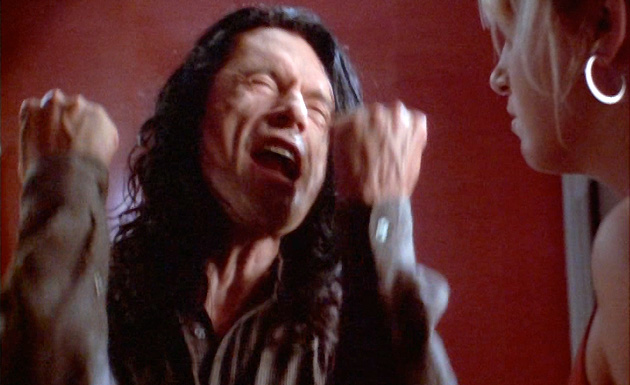 Drama with a capital “D.” The screenwriter’s enemy.
Drama with a capital “D.” The screenwriter’s enemy.
Today we’re doing something different. One of the biggest problems I see in amateur scripts is bad scene writing. The scenes don’t build, they don’t have any conflict, there’s no inherent drama in the scene. They just kind of lay there like a blanket. They’re forgettable. Which is the worst mistake you can make as a writer.
So the other day, we reviewed a script for Amateur Friday called, “The Cloud Factory.” I was trying to explain to the writer, Angela, in the comments that there wasn’t enough drama in the script. That everything the characters were going through was fairly routine, fairly tame, that nothing was making their journey difficult. She replied that she didn’t want to include over-the-top conflict and was trying for something “subtle.”
Whenever I run into a writer who says this in the absence of conflict, I cringe. While it’s true that there are times when you want to be subtle, in order to keep a reader/audience engaged, you need things to HAPPEN in your script. You need elements pushing and pulling at your characters. You need things to be hard for them in pretty much every scene, although how hard varies per situation. When a writer strips away conflict, they often think they have a delicate, subtle, reserved piece of material, unaware that the reader experiences it as a flat lifeless string of non-events where very little happens.
I speak from experience. I used to do the same thing. I wanted to be reserved. I wanted to be SUBTLE. And yet I was confused every time someone responded to my script with: “Nothing happens here. There’s nothing engaging about the story.” But but but… my characters are on a road trip together, and they both like each other but they’re both afraid to say it, and and and… I don’t want to overburden the story with too much drama cause it will be too on the nose and and and…” Ugh, gag me with a spoon.
Here’s what I think the problem is. Angela, as well as all the writers in her position, are railing against the wrong thing. It’s not that they don’t want drama in their stories. It’s that they don’t want artificial ON-THE-NOSE drama. The kind of capital-D Drama that a writer clumsily jams into the story because the screenwriting books told him to. Inserting drama into your screenplay, into all of your scenes, is like anything else you put into your screenplay. You not only have to do it, you have to do it artfully.
So there are really two skills at work here. First, there’s learning what drama is. And then there’s infusing it into the screenplay in a natural way. Now as I discuss drama here, I’m going to be using the words “conflict” and “drama” interchangeably, as there’s a lot of crossover in the two definitions. But, essentially, conflict creates drama. Now, for the sake of argument, let’s look at a scene that Angela might call too “overly-dramatic,” and see how we can fix it.
Let’s say I have a brother and sister in their 40s who haven’t seen each other (they live on opposite sides of the country) in over a decade. They’re reuniting because their mother just died and they’re home for the funeral. Jacob, the brother, arrives at their parent’s house and walks into the kitchen where his sister, Marla, is doing dishes. Now if you’re subscribing to the “THERE MUST BE DRAMA IN THIS SCENE!” theory that all the screenwriting books tell you to apply, you’re likely to go straight into an argument. “Nice, only a day late to your own mother’s funeral,” Marla says. “Fuck off, Marla! The only reason you came back early is so you could get it in with that loser you’re still obsessed with from high school!” “That ‘loser’ used to be your best friend! And at least I’m DOING something! Have you taken care of any of the arrangements! NO, I didn’t think so!” Etc. Etc.
Yeah, sure, we technically have drama here. But it’s over the top and obnoxious. Drama shouldn’t be thought of as constant yelling or giant obstacles always getting in your characters’ way. Think of it more as a push-pull, an imbalance in the scene between the characters involved. Yes, that will sometimes result in screaming, but more times than not, it’s a tension that hangs in the air, maybe due to a disagreement, or maybe because the characters don’t see things the same way. And if there isn’t that disagreement or issue between the characters, the conflict and drama will come from an exterior source, something pushing on the characters from the outside. This exterior variable won’t always be available to you on a scene-by-scene basis, so you’ll have to set it up earlier in the script. With this knowledge, let’s go back to the above scene and figure out how we can improve it.
Instead of putting Marla at the house, let’s put her at the funeral services for their mother. It’s five minutes before the service starts and lots of people are approaching Marla and offering their condolences. At that moment, Jacob bursts in, sweaty and ruffled. Marla is SHOCKED. Her brother dares to show up five minutes before their mother’s funeral! But, of course, she can’t yell at him. Not with all these people around. Jacob approaches. “Hey, sis.” “Hey, Jake.” She waits until they’re clear for a half second. With clenched teeth, “Nice of you to show up.” “Sorry, I missed my connection.” An old woman approaches: “I’m so sorry about your mother.” Marla puts the fake smile back on. “Thank you, Mrs. Buckley.” Jacob leans in, “Hey, I had to park in a handicapped spot. That’s not going to be a problem, is it?” She glares at him as the priest announces that they’re going to start the procession.
This is just one of many ways you could write the scene. If, for some reason, you need to have them back at the house, maybe Marla has a newborn who’s sleeping in the other room. She can’t wake him, so she must keep her anger in check while discussing Jacob’s tardiness. Or if you don’t want a baby involved, maybe Marla has a husband. And her husband loooooovvves Jacob. Jacob is like the coolest dude to him. So he’s stoked to see Jacob, and after the obligatory “I’m sorry about your mom,” he starts talking about them going hunting tother, wanting to know all about Jacob’s cool job. In the meantime, Marla is boiling, but doesn’t want to ruin her husband’s excitement, so she keeps it cordial. OR if you don’t want a third character to interrupt the scene, maybe these two are just not confrontational types. They keep everything buried – always have. So they have a very normal conversation, but the subtext runs deep. The two attack each other in more passive aggressive ways, despite the surface level conversation being cordial.
I think my problem with The Cloud Factory, was that the version of this scene that would’ve appeared in that script wouldn’t have had any issues or conflict at all. Marla and Jacob would’ve been on solid terms. They both cared a lot about their mom. Maybe Jacob was a little late showing up, but it wasn’t his fault, so Marla forgave him. Sure, a writer could argue, “Well I didn’t want any tension here. I just wanted a normal scene.” To that I say, okay. That’s fine. Every once in awhile, if it’s right for the story, there’s no conflict. But if you string together a BUNCH of these scenes, then it becomes a problem. Long passages of no drama – a drama drought – is the surest way to bore a reader.
With that in mind, let’s look at one of the scenes in The Cloud Factory. In the scene, Jenny, our hero, is grounded in Edinbergh. The other women in her group are taking a flight to the nearest base, but they don’t have room for Jenny (I’ve forgotten why Jenny is being singled out as having to stay, but we’ll assume it’s for a logically explained reason). Here’s the scene as written:
This is a scene that’s easy to screw up. It’s a short scene that’s all exposition, but necessary. We need to explain that they don’t have room for Jenny and then explain what she’s going to do next. Writers often see this and think, “Well, it’s short, so I’ll just throw it in there, even though it’s boring and all exposition.” You NEVER want to include a drama-less scene, especially one that’s all exposition, if you can write a more interesting dramatized scene instead. The first thing I noticed here is how passive the setup is to the scene. We’re getting information about Jenny not making the flight after the fact. You could try to force some conflict into this scene, like one of the girls not liking Jenny and therefore enjoying the fact that she can’t come, but it would feel false, like a scene out of Mean Girls.
The issue is that the scene isn’t taking place at the right spot. We need a scene setup that invites more conflict. If I were developing this with Angela, I’d have Jenny thinking she’s on the next plane going out with the three other girls. So she’s all packed up and ready to go. She goes to the plane with the others, and the pilot pops out. “Hold up hold up. What’s going on here?” They explain who they are. “No, I was told only three were coming. That’s all I have room for.” Now the girls are stuck in the precarious position of having to leave someone. It’s an awkward moment, but it creates conflict. Who’s worthy of going and who isn’t? Everybody makes their case. In the end, Jenny loses out (maybe gets screwed over). “I’m sorry, Jen. What are you gonna do?” “I guess I could take a train to London…” (etc. etc., this is where you put your exposition in). As you can see, we created drama in two places. First, with the pilot not letting all of them on, and then between the girls, who have to decide who’s staying. Way better scene, right?
Now I’m not saying there will never be quick exposition-only scenes in your script. I’m saying that you should always try to dramatize them if you can. Look at all your scenes on an individual basis, like I did above, and ask if there’s any drama/conflict there. If not, ask yourself if there’s another way you can do it. How bout you guys? How would you rewrite the above scene?
I should point out that conflict isn’t the only thing that creates drama. It’s just the main thing. But urgency creates drama (have you ever noticed that when you’re running out of time, nerves get nervier, patience gets thinner?). Stakes create a lot of drama (if someone’s job is on the line in a scene, the scene is going to have a lot more drama than if everyone’s job is safe). How personal the issue is creates drama (I care a lot less if somebody I barely know tells me they’re never going to talk to me again than if it’s my own sister). In general, with every scene, you’re trying to make things hard on your characters. The intensity of that pressure will vary depending on the scene, the situation, and the characters involved. But like I said above, if everything’s going well for your characters the majority of the time – that means long stretches of no tension, no pressure, no consequences, no issues, no subtext – you’re looking at an increasingly bored reader. You need to add drama to your scenes and to your script in general.
Genre: Drama/Supernatural/Children’s
Premise: An adolescent boy with a terminally ill single mother begins having visions of a tree monster, who tells him the truths about life in the form of three stories, helping him to eventually cope with his emotions over his dying mom.
About: This one finished Top 5 on the 2013 Black List. Patrick Ness adapted from his own children’s book. This one has an interesting backstory in that another author, Siobhan Dowd, came up with the idea and was set to write it, but died in 2007. Later, an editor (who worked with both Dowd and Ness) gave the idea to Ness. Just this past month, Liam Neeson signed on to play the big scary tree monster.
Writer: Patrick Ness (based on an idea from Siobhan Dowd)
Details: 105 pages (July 6th, 2012 draft)
So I was sitting there thinking, well, I ended up liking that dying teenagers script, The Fault In Our Stars. Maybe this is a sign of things to come. Maybe cancer scripts are my new thing! I mean, the way these things are coming on, they’re going to be rivaling comic book movies soon. Maybe that’s why Edgar Wright really dropped off Ant-Man. He wanted to make a Cancer Trilogy. Cancer… Ninjas?
As always, the trick with these scripts is to avoid the melodrama traps. If you’re set on making people cry, you’re probably not going to make them cry. Real life isn’t people hugging and saying goodbye on death beds unless you’ve earned it. Unless you’ve built up a story with a lot of complex emotions that are many times the exact opposite of death and sadness. This is something A Monster Calls does quite well.
The script is about a 12 year-old kid named Conor whose mother is dying of cancer. Remember folks, when you’re setting something like this up, don’t go for the obvious “mom in bed dying shot” to establish the cancer. Here, Ness wisely shows Conor getting ready for school. He cooks, he cleans. He does all the things a parent is supposed to do. So when you see him doing it, you know something’s off. Therefore, when his mom appears at the top of the stairs, weak and sick, we know exactly what’s going on.
So one night, Patrick’s trying to sleep when this huge thousand year-old scary tree in his backyard comes to life. The tree informs Conor that he’s going to tell him three stories that are going to change his life.
The structure of the script, then, cuts between three places. Either Conor with his family, Conor at school, or the tree telling him a story. In the first story, the tree tells the tale of a prince who kills his future bride in order to save his kingdom. It’s a confusing story because Conor’s not sure who’s right in the scenario. Is it right to kill someone to save others? Or isn’t everyone who kills wrong no matter what? The tree can’t answer that question for him. He has to figure it out himself.
This segues into a second story about a chemist who could’ve saved his neighbors’ lives but chose not to out of spite. And the final story is about an invisible man who wants to be seen. All three stories do not have the traditional “happy clear” ending that fairy tales have, and this frustrates Conor to no end.
(spoiler) As Conor finally comes to the realization that his mom is not going to get better, he realizes that the complex feelings he’s been experiencing (which include wishing his mom would die), aren’t that different from the complex tales the tree has been telling him. The moral here is that there is no black and white in life. We are instead drowning in grey.
A Monster Calls is quite good, if a little sad.
What stands out most about it is exactly the theme it trumpets – that we live in a morally complex world. As screenwriters, you’ve been told to explore the grey areas of your characters and your story, and A Monster Calls does so on almost every page.
As I stated about the tree’s first tale, the story actually ends with the tree helping the prince who killed his own fiancée! And the tree tells Conor this is perfectly fine! In order to save many, you sometimes have to get rid of one. I give it to Ness for throwing a seriously complex question out there, but how parents are going to explain this to their children, I have no idea.
I also enjoyed how Ness would do the unexpected. For example, this huge monster tree squeezes into Conor’s window in the opening. But he just sits there unimpressed. He’s not scared, not for a second. Can’t remember seeing a kid react like that before. Or the bully who bullies Conor – he doesn’t always attack. Sometimes he just stares at Conor or walks away. Or when Conor throws his best friend under the bus, he suffers no consequences for it. “A Monster Calls” often avoids the easy choice, which I loved.
Where A Monster Calls really excelled, though, was in its relationships. Remember what I’ve told you guys: You want 2 or 3 key relationships in your script that contain some sort of unresolved issue. If you get this right, you should have your reader zipping through the pages to get to the end, because as viewers, we’re not satisfied until we see people’s problems resolved. And the more unresolved problems there are, the more resolving we get to look forward to.
A Monster Calls created SIX unresolved relationships. Here they are…
1) Conor and the Tree – What are all these stories about and what do they have to do with him?
2) Conor and Lily – Conor’s old friend whom he broke up with.
3) Conor and the bully – A bully who keeps picking on Conor at school.
4) Conor and his Grandmother – He’s never liked his Grandmother and now he’s probably going to have to live with her.
5) Conor and his dad – His father has moved on to another family in America and they barely ever see each other.
6) Conor and his mom – His mom is dying, and it’s killing Conor every day.
This is something all of you should be doing. Identify an issue between your main character and each of the other main characters and use the duration of your screenplay to resolve that issue.
Despite this being really solid, there was something missing that I couldn’t put my finger on. I think I was looking for Tree Monster’s stories to connect with the cancer storyline better. How exactly does the prince killing his fiancée help Conor let his mom go? I’m still not sure. It was one of those deals where you go, “Ehhh, yeah, that SORTA works,” but it doesn’t work in that ‘hit you in the gut’ way. And when you’re talking about a subject matter this intense, I think we’re expecting to be hit in the gut, to experience that magical rare story moment where everything you’ve been reading all comes together at once. I’m sad to say that didn’t quite happen here.
One thing’s for sure though. This will be an interesting one to watch. It might be too dark for the average kid. But the emotional component is there in spades, which should draw in the adults. It reminds me a little bit of The Iron Giant in that respect. But this is darker than that. I don’t know. We’ll see. But regardless, A Monster Calls is definitely worth checking out.
[ ] what the hell did I just read?
[ ] wasn’t for me
[x] worth the read
[ ] impressive
[ ] genius
What I learned: I used to think cramming five or more unresolved relationships into a script was too much. That there wasn’t enough time to adequately explore all those relationships in an emotionally satisfying way. But this taught me you can explore more relationships as long as you keep some really short. Like the father in this script comes in for only three scenes (he flies in from another country). But those scenes are still very powerful because Conor and his father have such a huge disconnect.

